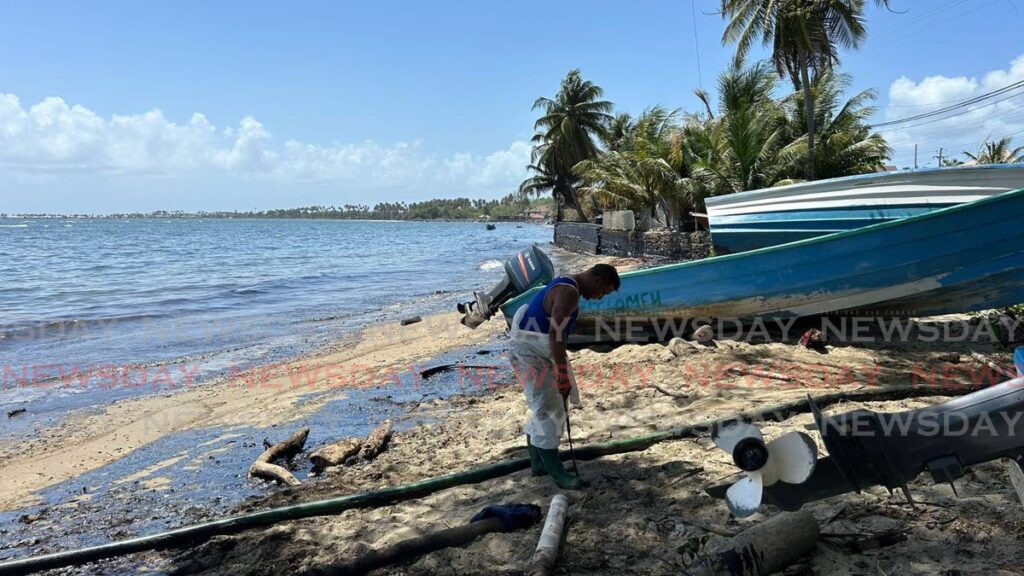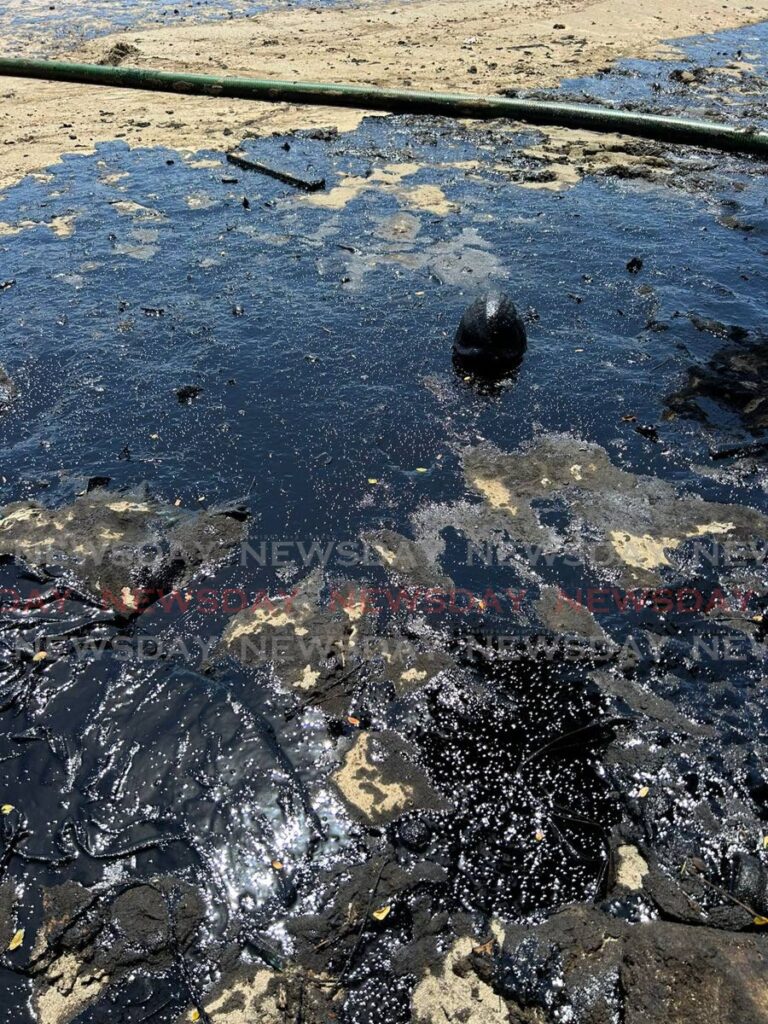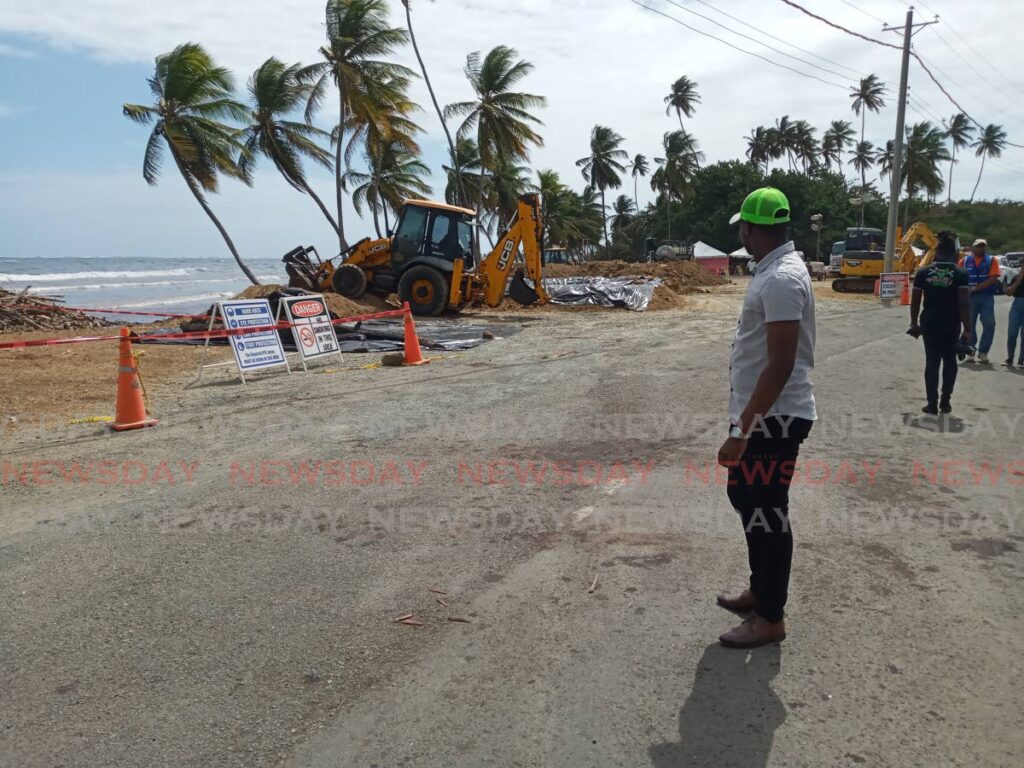Lambeau fishermen want help to get back to sea after devastaing oil spill

LAMBEAU FISHERMEN operating in the waters of the Atlantic Ocean are among the major casualties of the oil spill, which continues to pollute the waters off Tobago’s southwestern coast.
During the day, several of them can be seen huddled at Pascal’s corner drinking or smoking cigarettes to pass the time while others have resorted to gardening and other activities to support their families.
With Lent in full swing, the men would have been at sea catching fish. But the events of February 7 have dampened one of their busiest period of trade to the point where they now face an uncertain future.
On February 7, a barge leaking an oil-like substance was found overturned in the sea some 200 metres away from the Cove Eco-Industrial Park.
The barge – Gulfstream – was being towed by a tugboat reportedly destined for Guyana at the time of its discovery. The tugboat – Solo Creed – has not yet been found. Its owners also have not come forward to claim the vessel.
In the meantime, the oil-like substance, which has been identified by the Institute of Marine Affairs as bunker fuel, continues to leak from the Gulfstream, tainting the waters off Canoe Bay along the coast.
Although the spill has been contained to a great extent, Lambeau and other areas in the region remain under threat.
The village fishermen are known for bountiful catches of red fish, lobster, tuna, and shark, among others.
“The fishermen of Lambeau have been greatly affected by the spill,” Alison Thomas, secretary of the Tobago Unified Fisherfolk Association, told Sunday Newsday.
“They can’t ply their trade because they can’t go out at sea. They can’t even go and move their boats to another location because of health reasons and contaminating other waters with the oil that is below the boats. So they have not been surviving well.”
Owing to the number of fish they catch on any given day, Thomas said people often believe that fishermen make “big money."
“But at the end of the day, all does not go into the fisherman’s pocket. They have a crew to pay, expenses and overheads. So they need some redress because not a red dollar is coming in right now.”
Noting the spill took place days before the official start of Lent, Thomas could not say if the price of fish would increase or decline during the season.
However, she observed that people are already being told to avoid buying fish from the area.
“Word is spreading that people should not buy any fish from Lambeau because it is polluted. But people need to be mindful that the fishermen don’t just throw a line to catch fish. They go out and there is not much oil outside.”
In the meantime, Thomas said, some fishermen are planning to move to other areas, such as Buccoo, to fish.
She said on February 22, Tobago Emergency Management Agency (TEMA) and Heritage Petroleum workers helped to remove oil stains from a fisherman’s boat so that he could venture into other waters to fish. Others are expected to follow suit.
Thomas, who says her “navel string is planted” in Lambeau, now lives in Black Rock.
But since the spill, she has been volunteering her time and energy to clean-up and rehabilitation efforts, particularly at Petit Trou beach, which has been badly affected.
Thomas said she gets to the beach around 8.30 am and does not leave until about 5.30 pm.
“I am an allrounder. I do everything from scraping the beach of oil-stained sand to transporting water for people. I am involved in almost every aspect of the operation because is all hands on deck to get it done.”
She said people have responded to the appeals for volunteers.
“It is great. The youths and elders are coming together. But I think the young people need some form of incentive, give them some money. Not no chicken feed because this is oil you are dealing with. They are rolling up their sleeves and doing the dirty work.”
Thomas described Petit Trou as a haven for kite surfers and nature lovers.
“People often come here and park up just to enjoy the breathtaking view when they get a break. Other than that you have foreigners who come here for therapeutic reasons to walk on the beach because the sand is not too soft and not too hard.”
But she said the spill has been a “major step back” not just for the fisherfolk but the shop owners they support.
“Everybody is feeling it.”
Thomas, who is also the Lambeau Village Council PRO, said the fish vendors have since been relocated to the Shaw Park Food Hub. However, she said the vendors are concerned that the hub is not ideal for attracting customers.
“It was a bit challenging for them because it is not a prime area that everybody knows will sell fish up there. Some of them don’t make the turnover they used to make. They don’t even make $100 for the day.”
Although the THA is exploring all legal channels to bring those responsible for the spill to justice, Thomas urged the THA to seriously consider some form of compensation for the fishermen.
“We want the THA to really work with them, give them some kind of grant because rent have to pay, loans coming up, school fees coming up and no income coming in while they are just waiting.”
Ainsworth Daniel, acting president of the Lambeau Fisherfolks Association, estimates that at least ten fishermen from Lambeau have been directly affected by the oil spill.
Daniel, who has been involved in fishing for most of his life, said since the spill, several fishermen have reached out to the association for assistance to operate from other villages.
“But those who can’t do that right now are on the breadline,” he said.
Daniel said the boats that were active are now stationary because the oil has stained the vessels.
“Right now, TEMA, Heritage are moving those that are in the water to the side of the road to clean. One was moved and cleaned already.”

Like Thomas, he also observed that apart from the fisherfolk, fish mongers are also being affected by the spill “not by the catching of the fish but by the relocation (to Shaw Park Food Hub).
“They have had to make signs to let people know they are relocated.”
He believes some form of compensation should be given to the affected fisherfolk.
“My only appeal is that they could get some assistance because is not a lot of them, whether is by giving out hampers, finance, anyway that is possible.”
Daniel believes some assistance is forthcoming.
“If there is any compensation to come, it is going to come when this is sorted but for now, we concentrating on getting the fishermen back on their feet. Those who cannot ply their trade, we will try to see how best we can assist them.”
With the Lenten season already in full swing, Daniel said he is grateful that other parts of the island have not been impacted by the spill.
“North-east of Tobago is not really affected. So you have Castara, Parlatuvier, still getting their catch.”
However, he warned the villages might be affected by fisherfolk who may venture into waters in those areas despite having been exposed to the bunker fuel.
Tobago All Fisherfolk Association vice-president Junior Quashie described the oil spill as “a great blow” to Tobagonians.
“This impact here is major. This is a humongous impact because if I doh have something, I could go by a partner. And if meh partner doh get and meh next partner doh get, is pressure on all of us.”

He said he wished the rehabilitation process was completed.
“But we are still trying our best to get things controlled. We are working 24/7 but it is very hard on us.”
Quashie, who is also the Castara Fisherfolks Association president, said fishermen “would not kill customers with price” during Lent.
“Our price of fish in Tobago may not raise because we are a very kind-hearted and loving people. But let us hope that this thing could be solved very quickly so that everybody can be comfortable.”
Owing to scarcity in some areas, Quashie warned, that fish may also be rationed.
“There might be a limited amount of fish for everybody to get. So somebody who usually gets ten lbs might just get two lbs.”
THA Chief Secretary Farley Augustine in a previous interview said the THA has not ruled out compensation for fishermen and others directly affected by the oil spill.


Comments
"Lambeau fishermen want help to get back to sea after devastaing oil spill"